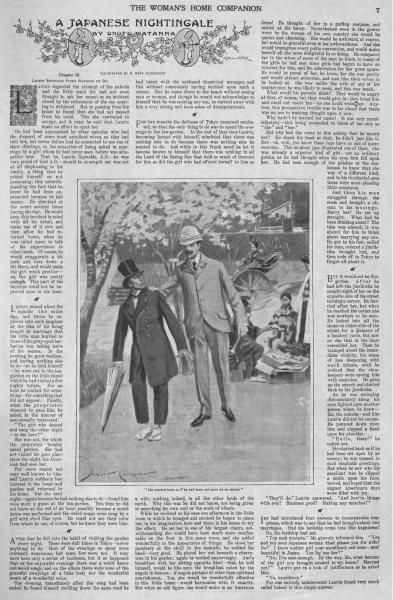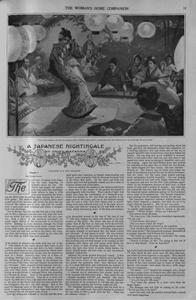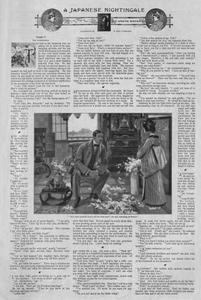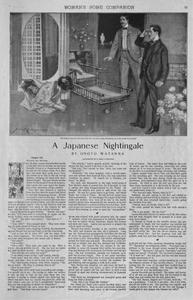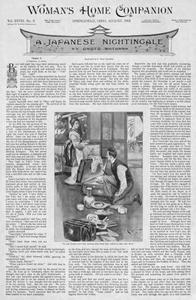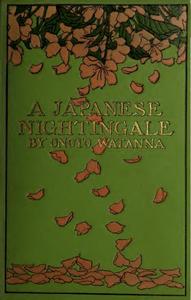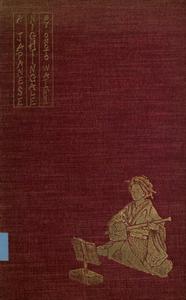Chapter III.
Laurin Reynolds Finds Nothing to Do
Laurin regarded the attempt of the nakoda and the little maid (he had not even thought to ask her name) as an incident closed by the retirement of the one aspiring to wifehood. But in passing from his house he found that she had not passed from his mind. This she continued to occupy, and it must be said that Laurin made no effort to eject her.
He had been approached by other nakodas who had the disposal of some most excellent wives, so they had told him, but never before had he consented to see one of their offerings, so the sensation of being asked in marriage by a girl whom he had never seen before was altogether new.That he, Laurin Reynolds, A.B.––he was very proud of that A.B.––should be so sought out was not at all displeasing to his vanity, a thing that he prided himself on not possessing; this notwithstanding the fact that he knew he had been approached because he had money. He chuckled at the event several times during the day. He would keep this incident in mind with all its detail, and make use of it now and then after he had returned home, when he was called upon to talk of his experiences in other lands. Of course, he would exaggerate a bit here and tone down a bit there, and would make the girl much prettier--no, the girl was pretty enough. This part of the incident could not be improved upon in the least.
Laurin mused about the episode the entire day, and twice he exploded into such laughter at the idea of his being sought in marriage that his little man hurried in to see if the gray-eyed barbarian was taking leave of his senses. In the evening he grew restless, and having nothing else to do—-so he told himself––he went out to the tea-garden on the little island which he had visited a few nights before. For an hour he waited for something––for something that did not appear. Finally, when the proprietor chanced to pass him, he asked, in the manner of one casually interested: “The girl who danced and sang the other night––is she here?”
She was not, for which the proprietor humbly asked pardon. She had not visited his poor place since the night the American had seen her.
For some reason not very well known to himself Laurin suddenly lost interest in the house and garden and returned to his home. But the next night––again because he had nothing else to do––found him once more a guest at the tea-garden. This time he did not leave at the end of an hour; possibly because a weird dance was performed and the weird songs were sung by a girl with vivid blue eyes. He could not see their color from where he sat, of course, but he knew they were blue.
After that he fell into the habit of visiting the garden every night. These were dull times in Tokyo––never anything to do. Most of the evenings so spent were intensely wearisome, but some few were not. It may have been only a series of incidents, but it so happened that on the enjoyable evenings there was a weird dance and weird songs, and on the others there were none of the graceful swayings of a lithe body nor the wonderful music of a wonderful voice. One evening, immediately after the song had been ended, he found himself striding down the same road he had taken with the enthused theatrical manager, and this without consciously having decided upon such a course. But he came down to the beach without seeing man or woman, and though he would not acknowledge to himself that he was seeking any one, he carried away with him a very strong and keen sense of disappointment.
For two months the dullness of Tokyo remained unabated, so that the only thing to do was to spend the evenings in the tea-garden. At the end of that time Laurin, becoming honest with himself, admitted that there was nothing else to do because there was nothing else he wanted to do. And while in this frank mood he let it become known to himself that there was nothing in all the Land of the Rising Sun that held so much of interest for him as did the girl who had offered herself to him as a wife; nothing, indeed, in all the other lands of the earth. Why this was he did not know, not being given to searching his own soul or the souls of others. While he reclined at his ease one afternoon in the little room in which he lounged and smoked he began to place her, in his imagination, here and there in his house to try the effect. He set her in one of his largest chairs, notwithstanding she would have been much more comfortable on the floor in this same room, and she added wonderfully to the appearance of things. He stood her passively at the shoji in the zashishi; he nodded his head––very good. He placed her out beneath a cherry-tree in his garden; again he nodded approvingly. And a breakfast with her sitting opposite him!––that, he told himself, would be like unto the breakfast eaten by the angels in heaven--if angels partake of other than spiritual nourishment. Yes, she would be wonderfully effective in this little house––would harmonize with it exactly. But what an odd figure she would make in an American dress! He thought of her in a golfing costume, and smiled at his fancy. Nevertheless even in the gowns worn by the women of his own country she would be quaint and charming. She would be awkward, of course, but would be graceful even in her awkwardness. And she would transgress every polite convention, and would make herself all the more delightful by so doing. He compared her to the wives of some of the men he knew, to many of the girls he had met since girls had begun to have an interest for him, and his admiration for her grew apace. He would be proud of her, he knew, for she was pretty and would attract attention, and men like their wives to be looked at. She was unlike the wife of any of his countrymen he was likely to meet, and this was much.
What would his parents think? They would be angry at first, of course, but they would give in; they loved him and could not resist her––no one could resist her. Anyhow, this prospective trouble was so far ahead that there was no use in wasting thought upon it now.
Why hadn’t he learned her name? It was very unsatisfactory––this being compelled to think of her only as “she” and “her.”
But why had she come to him asking that he marry her? He shook his head at that; he didn’t just like it. But––oh, well, you know these Japs have no end of queer customs. This incident just illustrated one of them. She was already a superior kind of girl––not an ordinary geisha, as he had thought when his eyes first fell upon her. He had seen enough of the geishas at the tea-houses to know that she was of a different kind, and to his Occidental eyes these were most pleasing little creatures.
Just then his man straggled through the room and brought a climax to his musings. Marry her! He sat up straight. What had he been thinking about? The idea was absurd; it was absurd for him to think about marrying any one. He got to his feet, called his man, ordered a jinrikisha brought him, and then rode off to Tokyo to forget all about it.
But it would not be forgotten. After he had left the jinrikisha he caught sight of her on the opposite side of the street turning a corner. He hurried after her, but when he reached the corner she was nowhere to be seen. He looked into all the shops on either side of the street for a distance of a hundred yards, but saw no one that in the least resembled her. Then he tramped about the immediate vicinity, his sense of loss deepening with each minute, until he noticed that the shopkeepers were eyeing him with suspicion. He gave up the search and started back to his jinrikisha.
As he was swinging disconsolately along his eyes lighted upon another person whom he knew––Ido, the nakoda––and him Laurin did not let escape. He pounced down upon him and clapped a hand upon his shoulder.
“Hello, there!” he called out.
Ido started back as if he had been set upon by an enemy; he was unused to such emphatic greetings. But when he saw who his assailant was he slipped a smile upon his face, bowed, and hoped that the august American’s days were filled with joy.
“They’ll do,” Laurin answered. “And how’re things with you? Business good? Making any matches?”
Ido had introduced four persons to incomparable happiness, which was to say that he had brought about two marriages. Had his lordship come into like happiness?
No, his lordship had not.
“You mek mistake,” Ido gravely informed him. “You nod yet seen Japanese woman thad please you for wife? No? I know nudder girl your excellency nod seen––mos‘ beautiful in Japan. You lig’ see her?”
“No; I’ve seen enough. By the way, Ido, what became of the girl you brought around to my house? Married yet?” Laurin put on a look of indifference as he asked this.
“No, excellency.”
For one entirely uninterested Laurin found very much relief indeed in this simple answer.
8
“But I think she going be,” Ido went on, calmly. “Two odder gents—-what you say? consider? yes?––consider her.”
These words drove relief from Laurin’s heart and instantly set up in its place a raging jealousy. But he compelled himself to remark quite easily, “You don’t say!”
Ido confirmed his statement with a nod that was almost a bow.
“I think I’ll go around to see her and congratulate her,” Laurin went on. “Where does she live, Ido?”
“She nod lig’ thad you come ad her house.”
“Ah, well, let it go, then. But say, I really would like to see her again before she’s married. Rather took a fancy to her, you know. Couldn’t you bring her out to call on me to-morrow morning?”
“I going be very busy to-morrow.” He saw no chance to make a marriage fee, so saw no reason for his taking the trip.
“I’ll pay you for your trouble--needn’t worry about that.”
Perhaps Ido could arrange it so that he could come: yes, now that he thought again, he felt absolutely sure he could come. So it was settled that he and the girl should visit Laurin at ten o’clock the next day.
Chapter IV.
In Which the East and the West Are United
The announcement of his man that Ido and his charge had arrived contained no news for Laurin, for he had been watching the road from Tokyo since nine o’clock, and had seen them while they were yet far off. Nevertheless he did not enter the zashishi until his man came to him with the word that guests from the city were awaiting him, and then he had no definite idea of what he intended doing.
She was dressed exactly as she had been on her previous visit, and just as she had then done she made obeisance almost to the floor in greeting him. He hastened her recovery from the deep curtsy by taking her hands and raising her to an upright posture.
“You have come to see me again. I am very glad to see you,” he said.
“nakoda say you lig’ see me; tha’s why I coming.” There was not a trace of her former coquetry in her manner.
“Yes. I had to send Ido after you. I suppose you would never have let me see you again if I had not.”
“You nod want thad I marry with you. You send me ‘way. I thing you nod care seeing me again.”
“We could be friends even if we didn’t care to marry, couldn’t we?”
“Frien’? I nod thing I want frien’.”
“I’d like to have you for a friend, all the same. But I’m afraid I’ll not get to. Ido”––he hesitated––“Ido says you’re going to be––be married, you know.”
She inclined her head.
“You’re not married yet, are you?” he asked, in alarm, forgetting that he had put this same question to the nakoda the day before.
“Nod yet.”
“Do you––um––like him?”
“Which one, my lord?” She looked up at him innocently.
“Oh, both of them!” He was beginning to get angry. He would find pleasure in laying violent hands upon the two––one at a time.
“Jus’ liddle bid, augustness.”
“Better than you do me?” he asked, hesitatingly.
She shook her head decisively. “You nod so old, and nod so––all hairy-lig’!” She rubbed her little hands over her face, by which he understood that the two wore beards.
He hardly knew what to say next, and the silence grew embarrassing to him. She broke it by remarking, quietly: “nakoda say thad you lig’ mek liddle talk with me.”
He turned to the match-maker, who was pretending deep interest in a framed drawing on the wall. “Say, Ido, just step into the next room a minute, will you?”
“You have never even told me your name,” he said, after the nakoda had withdrawn.
“Yuki.”
“I like it. Well, now, Yuki, mayn’t I visit you at your home––before you are married?” He was anxious to see what her parents were like and how she lived.
“Mos’ poor house––so liddle house. Augustness nod lig’ come.”
“But I don’t care if it is. I want to come, anyhow. Besides, I want to see you, not the house. Won’t you tell me where you live?”
“I nod want thad you come,” she answered, with simple directness.
“Oh, that’s it, is it!” he said, somewhat taken aback.
Her words gave him offense, but a glance at her and it was gone. She seemed such a simple little body, yet he knew he did not understand her. Her eyes, which she had kept turned downward, slowly raised and looked questioningly into his own. Such wonderful eyes! Such a simple, exquisite face! He was suddenly suffused with a great wave of tenderness, and he bent low and gently made prisoners of her hands. However indefinite his purpose had been up to this time it was definite enough now.
“Do you remember, Yuki, what you asked me when you were here the other day?”
“Yes.” She still gazed at him questioningly.
“Would you like to––would you rather marry me than one of those other men?” he said, softly.
“Yes,” again.
He hesitated, and she asked, “You want thad I marry with you, augustness?”
“That’s just what I want, Yuki, dear,” he whispered, drawing her hands up to his lips.
“All ride.” She trembled--perhaps shivered is the word that expresses it more accurately as she said this, but gave no other sign that she felt any emotion whatever.
Before Laurin could so much as touch his lips to her forehead Ido entered, smiling his professional blessing. It was evident that in the other room he had found no drawing to distract his attention, so was giving all his eyes and ears to what was going on in this, and could wait no longer to press his claim. Laurin, seeing an unpleasant duty before him, and desiring to have done with it at once, told Yuki that he would be back in a minute, and led Ido into the room out of which he had just come. The nakoda began to make terms. This part was loathsome to the young man.
“Why,” he said, hotly, “if we’re to be married she can have all she wants and needs.”
That wouldn’t do, the wary nakoda told him; there would have to be a marriage settlement and a stated allowance agreed upon. He would have to pay more, also, as she was a maid and not a widow. Laurin made no effort to conceal his disgust, and to have the bargaining over with at once agreed to the sums the nakoda mentioned. Ido was to have two hundred dollars, and the girl was to receive a weekly allowance of fifteen dollars.
When the ugly terms of the agreement were completed the nakoda bowed himself out and Laurin went back to Yuki. He found her changed; her simplicity had left her and her coquetry had returned. She stood off from him, and he felt constrained and awkward.
After a time she asked him, with a shrewd inflection in her voice, “You going to lig’ me, excellency?”
“No question of that,” he answered, promptly, smiling.
“No,” she repeated; “tha’s sure thing.” And then she laughed at her own assurance, and she was so pretty he wanted to kiss her, but she backed from him in mock alarm. “Tha’s nod ride,” she said, “till we marrying.”
“And you––do you think you will like me?”
She surveyed him critically. Then she nodded. They laughed together this time, but when he approached her she grew fearful. He did not want to frighten her.
“You god nod anudder wife?” she asked.
“No! What do you think I am?”
“I god nod anudder husban’,” she informed him, complacently.
“I should hope not.”
“Perhaps,” she said, “you marrying with girl in Japan thad god married before? Me––I never.”
“No, of course not.” He didn’t quite know what she was driving at.
Then she said, “You pay more moneys ad liddle girl lig’ me thad nod been marry before?”
He recoiled and frowned heavily at her.
“I settled that matter with the nakoda,” he said, coldly. Seeing he was displeased she tried to reassure him. She smiled at him engagingly, coaxingly.
“You nod liging me now?”
But his face did not clear up. She had hurt him deeply by her reference to money.
“I thing you nod want me. I go ‘way. You lig’ American girl better.”
She turned and was making her way slowly out of the room when he sprang after her. “Don’t, Yuki!” he cried, and caught her eagerly into his arms. She yielded herself to his embrace, and for the first time he kissed her.
After she had left him he stared with some wonder at the reflection of himself in a mirror. So he was to be married, was he? Yes, there was no getting out of it now. As for that, he didn’t want to get out of it––of this he was quite sure. He was very well content––nay, he was enthusiastically happy––with what the future promised.
But his happiness might have been felt in lesser measure if his eyes, instead of staring at his mirrored likeness, could have been fixed on Yuki. She had borne herself with a joyous air to the jinrikisha, but once within it and practically secure from observation the life had seemingly gone out of her. The brown of her skin had paled to gray, and all the way to Tokyo her eyes shifted neither to the right nor to the left, but stared straight ahead with blank gaze into nothingness. And once when Ido looked down he found they were filled with tears.
A few days later they were married. It was a very quiet little tea-drinking ceremony, with no one there save Yuki, Laurin and the nakoda, and Yuki herself sang the marriage song, “Takasago.”
Laurin Reynolds was fascinated and bewildered at the turn events had taken. He was very good and gentle to her, and for a couple of days after the ceremony she seemed quite happy and contented. Then she disappeared, and for a week he saw nothing of her. He greatly missed her, his little bride of three days. He wished ardently to have her back again, and her absence alarmed him. Her little arts and witcheries had grown on him even in this short period of their acquaintance. Toward the end of the week she slipped into the house quietly, and then went about her household duties as though nothing unusual had occurred. She did not offer to tell him where she had been, and he felt strangely unwilling to question her.
Instead of becoming used to her each day found him more puzzled and less capable of knowing or understanding her. Now she was clinging, artless, confiding, and again shrewd and elfish. Now she was laughing and singing and dancing like a little child, and again he could have sworn she was weeping, though she would deny it stoutly and pooh-pooh and laugh away such an idea.
Laurin asked her one day how she would like to be dressed in American clothes. She mimicked him. She mimicked everything and every one, from the warbling of the birds to the little man and maid who waited on them.
“I loog lig’ this,” she said, and humped a bustle under her ridiculously tight kimono and slipped a large sun hat over her face. Then she laughed out at him and flung her arms tightly about his neck.
“You lig’ me be American girl?”
“You are a witch, Yuki-san,” he said.
“I want new dress,” she said, promptly, and held out a pink little palm. He frowned. He almost disliked her when she spoke of money. He filled her hand, however, with change from his pockets, and when she broke away from him, which she did as soon as she had the money, he wanted to take it back. Her pretty laughter sifted out to him through the shoji at the other side, and he knew she was mocking him again.
(TO BE CONTINUED)
